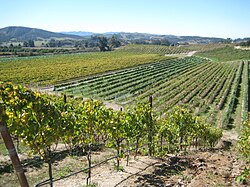Sta. Rita Hills is an American Viticultural Area located in Santa Barbara County, California. From its creation in 2001 through 2006, the wine appellation was officially named Santa Rita Hills AVA. The formal name change was the result of a protest by and subsequent negotiations with Vina Santa Rita, a very large Chilean wine producer that was concerned about the AVA name diluting its international brand value. The name change took effect on January 5, 2006, with a yearlong period for producers in the AVA to change their wine labels.[2][4] In 2016, TTB expanded the approximately 33,380 acres (52 sq mi) “Sta. Rita Hills” viticultural area by approximately 2,296 acres (4 sq mi).[3]
| Wine region | |
 | |
| Type | American Viticultural Area |
|---|---|
| Year established | 2001[1] 2005 amended:[2] 2016 expansion:[3] |
| Country | United States |
| Part of | California, Central Coast AVA, Santa Ynez Valley AVA |
| Other regions in California, Central Coast AVA, Santa Ynez Valley AVA | Ballard Canyon AVA, Happy Canyon of Santa Barbara AVA, Los Olivos District AVA |
| Total area | 48 square miles (30,720 acres)[1] 2,296 acres (4 sq mi)[3] |
| Size of planted vineyards | 2,700 acres (1,093 ha)[4] |
| No. of vineyards | over 59[1] |
| Grapes produced | Barbera, Chardonnay, Dolcetto, Dornfelder, Grenache, Mission, Pinot blanc, Pinot gris, Pinot noir, Riesling, Sauvignon blanc, Syrah, Viognier, Zinfandel[4] |
| No. of wineries | 54[5] |
| Comments | As of 2020 |
Terroir
editSta. Rita Hills is a sub-region of the larger Santa Ynez Valley AVA, located between the towns of Lompoc and Buellton with the Purisima Hills on the north and the Santa Rosa Hills on the south. The wine region is exposed to fog and coastal breezes from the nearby Pacific Ocean. The hills are oriented on an east-west axis, which allows cool ocean breezes from the Pacific Ocean to enter the valley creating a cool mesoclimate. Combined with the rocky nature of the area, the Santa Rita Hills area is well-suited for the growing Pinot noir grapes, which grow well in cool climates with rocky soil. The region is best known for Chardonnay, Pinot noir, and cool climate Syrah varietal wines.
Wine industry
editThe AVA petition was submitted from viticulturists and vintners in the area under the direction of J. Richard Sanford (Sanford Winery), Bryan Babcock (Babcock Vineyards and Winery), and Wesley D. Hagen (Vineyard Manager of Clos Pepe Vineyards).[1] Wineries and locations in Sta. Rita Hills were featured in the 2004 U.S. film Sideways. Sideways Fest is an annual three-day event hosted by the Sta. Rita Hills Wine Alliance celebrating the anniversary of the movie's filming in the Santa Ynez Valley.[6][7]
See also
editReferences
edit- ^ a b c d "Establishment of Santa Rita Hills Viticultural Area (98R-129 P)" (66 FR 29476 , 27 CFR 9 Doc#: 01-13645). Federal Register. Alcohol and Tobacco Tax and Trade Bureau. May 31, 2001. pp. 29476–29480. This article incorporates text from this source, which is in the public domain.
- ^ a b "Santa Rita Hills Viticultural Area Name Abbreviation to Sta. Rita Hills (2003R-091P)" (Final Rule, 27 CFR 9 Docket No.T.D. TTB-37 [Notice No. 40 Ref: T.D. ATF-454]). Federal Register. Alcohol and Tobacco Tax and Trade Bureau (TTB): 72710–72713. January 6, 2006.
This Treasury decision modifies the name of the existing "Santa Rita Hills" American viticultural area by abbreviating its name to "Sta. Rita Hills."
- ^ a b c "Expansion of the Sta. Rita Hills Viticultural Area" (Final Rule, 27 CFR 9 Docket No.TTB-2014-0007: [T.D. TTB-141 Ref: Notice No. 145]). Federal Register. Alcohol and Tobacco Tax and Trade Bureau (TTB): 56492–56504. August 22, 2016.
TTB is expanding the approximately 33,380-acre "Sta. Rita Hills" viticultural area in Santa Barbara County, California, by approximately 2,296 acres
- ^ a b c "Sta. Rita Hills (AVA): Appellation Profile". Appellation America. 2007. Archived from the original on March 7, 2009. Retrieved January 25, 2008.
- ^ "Sta. Rita Hills AVA Wineries". Santa Barbara Vintners Association.
- ^ "Sideways Fest". California 101 Traveler's Guide. September 27, 2019.
- ^ Elliott, Farley (May 13, 2020). "Could California's Central Coast Lead the Way For the Future of Local Food Tourism?". Eater LA. Retrieved May 14, 2020.